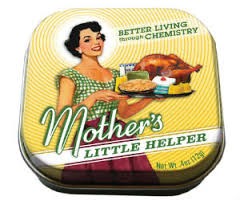An Epidemic of “Wine Moms” and “Wine Dads”
A great article in the New York Times brought to light that modern parenting culture lightheartedly endorses alcohol as a coping mechanism for the demands of marriage and family – one mocking mug at a time. What many don’t realize is that there is a dark history of promoting chemicals to men and women with situational stress. Dr. Leena Mittal, a perinatal psychiatrist and addiction specialist at Brigham and Women’s Hospital in Boston recalled marketing campaigns from the 1950’s and 1960’s advertising “Mother’s Little Helper” – a tranquilizer that was copiously prescribed to women which would suppress their stress in the short-term instead of offering them a solution that would help address it long-term. “This may be wine” printed on a coffee mug may seem cheeky at most, but the undertones of the message have concerning and far-reaching impacts on society.
The Correlation Between the Opioid Crisis and Wine-Mom Culture
The opioid crisis plaguing America has brought the impact of addiction on families to the forefront. As a result, there is renewed interest in sobriety particularly among parents. According to The National Survey on Drug Use and Health, 10% of American children lived in homes where a parent struggled with alcohol use disorder but it was unlikely their conditions would be treated for fear of losing custody of their children. A study from Jennifer Wolf, at the Prevention Research Center in Oakland California illustrated the impact of ‘social context’ on parental drinking and the effect of parental alcohol use on children. According to the study, “parental alcohol use is associated with several negative outcomes for children, including child substance use behaviors”. Furthermore, “…emerging evidence suggests that even low levels of parental alcohol use are associated with child alcohol use and physical abuse”.
Social Media Offers a Harmful Solution to the Problem it Creates
Gabrielle Glaser, who wrote “Her Best Kept Secret: Why Women Drink – and How They Can Regain Control” makes and important point about the impact of social media on worsening the parental pressures on mothers. She outlines how not only is social media used to circulate the memes and tongue-in-cheek slogans that normalize wine as the ‘cool-mom’s’ medicine for stress, but it also serves as a publishing platform for content that makes many women feel inadequate both as women and as mothers. Pictures of other women’s children, spouses, experiences and possessions can make a person feel completely insufficient. Social media perpetuates the vicious cycle by exposing women to content that makes them feel like they’re not good enough and then advocates alcohol as the easy fix. In this way, wine-parent culture has become the new “Mother’s Little Helper”. It endorses and normalizes the use of alcohol as a coping mechanism for parenting.
So, What Should Parents Turn to For Real Help?
There are two parts to the answer of this question. One part is to discuss lifestyle choices that can help prevent alcohol use disorder in parenting and the other is to discuss therapeutic options for real mental health conditions that merit serious treatment.
Part I: Life Style Choices
With regards to lifestyle recommendations, an article in the New York Times features interviews with several moms who discuss their sober parenting techniques. Their suggestions include substituting the soothing properties of alcohol for healthier options like walks, baths and reading. The social void left by being a sober parent can be addressed by opting to join running groups, book clubs and swapping in “drinks with the girls” for coffee-dates, massages or simply just talking. Unfortunately, these choices are not likely to be available to every mom, nor are they likely to be sufficient for most. Even reading an article like this in the NY Times can be demoralizing if you are struggling.
Part II: Access to Professional Treatment
The second part to this answer has to do with calling debilitating stress, anxiety and depression what they are and not belittling or normalizing them. These are serious mental health conditions that shouldn’t be suppressed with a temporary Band-Aid like alcohol. Professional treatment that offers long-term results often includes psychotherapy, support groups and or psychopharmacology if necessary. Women struggling with these conditions should feel safe to seek the professional treatment they need to be the best versions of themselves.
Sources:
https://www.ncbi.nlm.nih.gov/pmc/articles/PMC4595850/
https://www.samhsa.gov/data/sites/default/files/report_3223/ShortReport-3223.html
https://www.nytimes.com/2018/03/07/well/family/wine-moms-drinking-alcohol-sober-parenting.html

